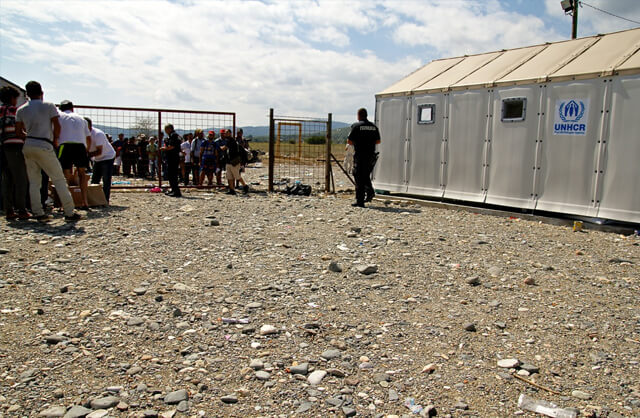The situation at the border crossings Gevgelija and Kumanovo for the period: 01.02.2016 – 07.02.2016

The weekly report on the situation at the border crossings Gevgelija and Kumanovo includes the following topics: Available facilities and conditions at the camp and Institutional treatment. The report can be downloaded at the following link.
Gevgelija
Available facilities and conditions
14,589 refugees were registered in the course of this week, which is a 19,5% increase compared to the previous week when a total of 12,209 refugees were registered.
This week was marked by the protests of taxi drivers, who blocked the railroad on several occasions in sign of protest against the decision not to allow refugees take taxis as means of transport to Tabanovce. The protest was paused a few times, when groups of refugees were sporadically allowed to travel by taxi. Although the Headquarters of the Crisis Management Center has reached a decision to let the refugees use taxis, this decision has not been complied with. The taxi drivers protested once again on 06.02.2016, but this time they were prevented from blocking the railroad by the police forces.
After the decision adopted by the Republic of Macedonia, the setting up of a second layer of barb wire fence, parallel to the already existing fence, has started. The goal of this fence is to prevent or decrease the illegal crossing by refugees.
Apart from upgrading the camp with new toilets, there has also been progress in the construction of a kitchen where the refugees will be able to get food within the camp.
Institutional treatment
The transiting of refugees takes place in an organized and coordinated manner, and the authorized officials are doing their job responsibly.
At present, there are police officers from the Republic of Hungary, Slovenia, Slovakia and the Czech Republic deployed in the camp. They are working in shifts and assist the refugees upon entering the camp and during the registration process, and help them group before they board the train.
Various media, domestic and foreign, are present in the camp on daily basis.
Kumanovo
Available facilities and conditions
It is expected that the kitchen in the camp will start functioning any moment.
In the course of the week, the refugees’ movement towards the Serbian border was aggravated during the rainy days due to a lack of raincoats. This led to anxiety and disorder in the camp, and as a result the refugees were held back for longer periods of time.
The Helsinki Committee recommends that the competent institutions provide raincoats in the camp at any given time, regardless of the weather conditions.
Institutional treatment
The biggest problem in the camp remains the everyday arrival of the so-called “economic migrants”, who arrive on foot, down illegal roads (independently, or aided by groups of smugglers) or are sent back from the Serbian border. There is no information in the camp as to how these people need to be treated, so they leave the camp, left to themselves.
The Helsinki Committee appeals to the competent authorities to urgently take measures to adequately treat the groups of “economic migrants” or provide their controlled and organized transport back to the Greek border.
In cases when the refugees are allowed to take a taxi from Gevgelija to Tabanovce, the taxi drivers’ attitude towards the refugees is worrying. Very frequently they change the fares from the moment of departure to the moment of arrival, thus tricking the refugees into paying more and provoking clashes and physical conflicts. In an isolated case, the police intervened to prevent the violence of a taxi driver over a group of refugees.
The Helsinki Committee expresses concern over the taxi drivers’ treatment of refugees. Therefore we recommend providing presence of police officers at the places where refugees arrive by taxi, in order to avoid any misunderstandings.
 This report is made possible by the generous support of the Foundation Open Society Institute (FOSI) within the project „Improvement of the rights protection for migrants and asylum seekers in the Republic of Macedonia“. The contents are the responsibility of the Helsinki Committee for Human rights of the Republic of Macedonia and do not necessarily reflect the views of
This report is made possible by the generous support of the Foundation Open Society Institute (FOSI) within the project „Improvement of the rights protection for migrants and asylum seekers in the Republic of Macedonia“. The contents are the responsibility of the Helsinki Committee for Human rights of the Republic of Macedonia and do not necessarily reflect the views of



